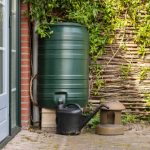The Best Way to Store Water for Emergency Situations
November 10, 2023 9:06 pm Leave your thoughts In times of emergency, having a sufficient supply of clean drinking water is crucial. Whether you’re facing a natural disaster, power outage, or any situation that disrupts regular water supply, having a well-stocked emergency water supply can provide peace of mind. However, it’s not enough to simply store water; it’s equally important to store it in the right way to ensure its safety and freshness. Here are some tips on the best way to store water for emergency situations.
In times of emergency, having a sufficient supply of clean drinking water is crucial. Whether you’re facing a natural disaster, power outage, or any situation that disrupts regular water supply, having a well-stocked emergency water supply can provide peace of mind. However, it’s not enough to simply store water; it’s equally important to store it in the right way to ensure its safety and freshness. Here are some tips on the best way to store water for emergency situations.
1. Choose the Right Containers:
When storing water for emergencies, it’s essential to use food-grade containers that are specifically designed for long-term water storage. These containers are made of materials that are safe for storing drinking water and are typically BPA-free. Avoid using containers that were previously used for chemicals or non-food substances, as they may contaminate the water. Opt for sturdy containers that are tightly sealed to prevent leaks and keep out any potential contaminants.
2. Clean and Disinfect Containers:
Before filling your chosen containers, make sure to clean them thoroughly to remove any dirt or residue. Wash them with a mild dish soap and rinse them well with clean water. Once clean, sanitize the containers by filling them with a mixture of one teaspoon of bleach for every gallon of water. Let the solution sit for a few minutes, then rinse the containers with clean water again. This step ensures that any remaining bacteria or contaminants are eliminated before storing the water.
3. Use Treated Tap Water:
The best source of emergency water storage is your tap water. Most municipal water supplies in developed countries are treated and safe to drink. Fill your containers directly from the tap, making sure to leave about an inch of headspace to allow for expansion if freezing occurs. If your tap water has been treated with chlorine, it will already contain a certain level of disinfectant. However, if your water source is untreated, it is crucial to treat it with water purification tablets or drops before storing it for emergencies.
4. Rotate Your Water Supply:
Water, like any other perishable item, can go stale over time. It is recommended to rotate your emergency water supply every six months to ensure its freshness. Simply use the stored water for everyday use (such as watering plants or cleaning) and refill the containers with fresh tap water. Remember to label and date your containers to track the rotation properly. By regularly refreshing your stored water, you can guarantee a fresh and reliable supply in case of emergencies.
5. Store in a Cool, Dark Place:
Proper storage conditions significantly impact the longevity and quality of stored water. Keep your containers in a cool and dark place, away from direct sunlight and extreme temperature fluctuations. Heat and light can promote bacterial growth and degrade the quality of the water, so choosing a cool and stable storage location is essential. A basement or a pantry can be great options for storing water, as long as they are free from any potential contaminants.
6. Consider Portable Water Storage Options:
In addition to storing water in large containers, it’s also a good idea to have portable options available. Portable water storage solutions, such as water pouches or collapsible water bottles, are lightweight, compact, and easy to carry in case you need to evacuate or be on the move. These smaller containers are convenient for individual use and can be easily packed in emergency kits or bug-out bags.
7. Educate Yourself on Water Treatment Methods:
While storing water is crucial, it’s also essential to have knowledge of various water treatment methods. In the event of a prolonged emergency or when your stored water supply runs out, knowing how to treat water from alternative sources (such as rivers or lakes) can be lifesaving. Research and learn about methods like boiling, using water filters, or using water purification tablets. Understanding these techniques will equip you with the skills needed to make contaminated water safe for drinking.
Conclusion
Having a well-prepared and accessible water supply is fundamental for any emergency situation. By choosing the right containers, keeping them clean and properly sealed, storing water in a cool and dark place, and regularly rotating your supply, you can ensure a fresh and safe water source during times of need. Additionally, portable water storage options and knowledge of water treatment methods further enhance your preparedness. So, take the necessary steps now to store water properly, and you’ll be better equipped to handle any emergency that comes your way.
Got Questions? Let Us Help!
Welcome to Love Well & Pump Supply, LLC! Love Well & Pump Supply, LLC has been supplying well services since 1967 to Union. We specialize in water well inspections, abandoned wells, waterline piping, installations of pumps and tanks, camera inspections, trench digging, and freshwater services. We work closely with irrigations in residential, farms, agricultural, nurseries, greenhouses, and light commercial. Love Well & Pump Supply, LLC works with all major brands of pumps and systems, ensuring no job too large for us to handle. We offer free estimates and free water testing, so give us a call today!
Categorised in: Water Storage Tanks, Water Treatment Systems
This post was written by admin
